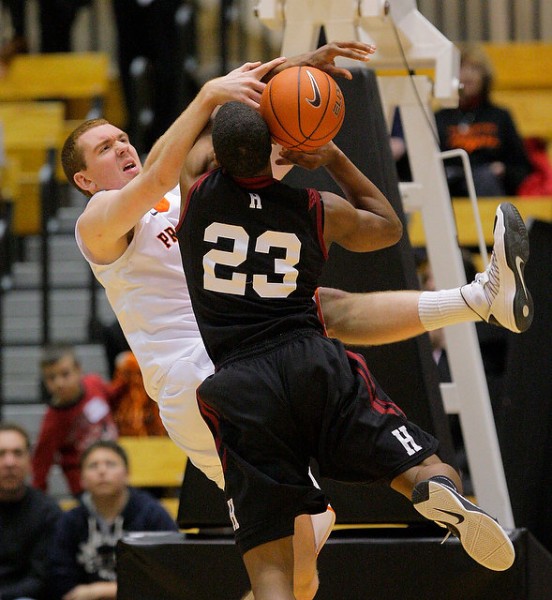Harvard, Princeton and the Grind of a 14-Game Tournament
Posted by Tommy Lemoine on January 11th, 2014On the road and without its best player, Harvard lost a close game to UConn on Wednesday night in what might be the death-knell for its at-large hopes; at best, Tommy Amaker’s team will be sweating it out on Selection Sunday if unable to clinch the Ivy League’s automatic bid. Which is a shame. By most measures (including the dubious ‘eye test’), the Crimson is an NCAA Tournament-caliber group this season, something it could have cemented with a win against the Huskies this week or over Colorado back in November. But neither of those outcomes occurred, so Harvard’s March hopes now likely hinge on its ability to hold off Princeton in conference play. With the Tigers playing well and the unique Ivy schedule sure to cause trouble, that task will be more difficult than first thought.
Ivy League teams play a 14-game, double round-robin schedule with the distinctive feature of squaring off on back-to-back nights — Fridays and Saturdays — for six straight weeks. Every weekend is either spent at home or on the road. In the latter case, it often means finishing a basketball game, taking a lengthy bus ride across the Tri-State Area and/or New England to another campus and suiting up again the very next night. It is a test of focus and conditioning that can make-or-break a team’s title chances. Take last year’s Princeton team as an example: After beating Harvard the prior weekend and carrying a half-game lead into the final back-to-backer (with the annual Princeton/Penn outlier game scheduled the following Tuesday), the Tigers went on the road and lost a tough game to Yale on Friday night, traveled to Providence the next day to take on Brown — a team it had beaten by 17 points a month before — and promptly lost by double figures; Harvard went on to win the conference and play in the NCAA Tournament. All totaled, not including their one-game playoff in 2011 (and including Harvard’s rare Sunday game at Columbia last season), exactly half of Harvard and Princeton’s combined Ivy League losses have come on the second game of road double-headers since 2010. Fatigue sets in and the schedule takes its toll.
So with conference play officially tipping off this weekend, how do things stack up for the two likely contenders? Well, for one, each of Harvard/Princeton’s away games against the other comes on the back end of a weekend, meaning the home team will have an even greater advantage than it already would have. But both schools have to deal with that. The real deciding factor — besides the actual talent and depth of each team, which we’ll get to in a moment — might be Columbia. The Lions are the only other Ivy League squad ranked within the KenPom top 100 (or even top 175, for that matter), recently knocking off America East favorite Stony Brook and nearly beating Michigan State and Manhattan earlier this season. Featuring a huge frontcourt that defensive rebounds very well, Kyle Smith’s club is adept at grinding opponents down with a methodical style that would not be fun to confront with tired legs. Harvard gets the benefit of playing at Columbia on the front end of a road trip in mid-February before travelling to lowly Cornell the night after. Princeton, on the other hand, will take the four hour trip from Ithaca to Manhattan after playing Cornell, where it faces Columbia in its second-to-last game of the season. While the league could be well in hand by that point, one way or the other — Brown, Yale and Dartmouth might also be equipped to pull an upset or two — there’s also a real chance that the conference championship rests on that outcome.
Ultimately, though, the Ivy League title will be determined by the talent and proficiency of its competing teams, and from a talent standpoint Harvard has the undeniable edge. Even with Wesley Saunders currently out with a sore knee, the Crimson are still one of the most skilled and athletic teams the conference has ever seen, capable of overpowering inferior opponents even on bad nights. When Saunders does rejoin the fold — he is currently out ‘indefinitely’, according to Amaker — his scoring prowess and stingy perimeter defense will enable an already-excellent backcourt (Brandyn Curry, Laurent Rivard and Siyani Chambers, who scored 21 points against UConn) to control most games. The frontcourt is equally deep and talented. But talent alone does not always cut it, especially in a conference with as little margin for error as the Ivy. And that’s why Princeton has more than a fighting chance — the Tigers are incredibly efficient offensively and nearly unbeatable when they shoot well from behind the arc, which is often. Senior guard T.J. Bray leads the program’s patented offensive attack, averaging over 17 points, six assists and shooting 43.5 percent from deep. Every player on the court is capable of hitting threes, though, and when they do — such as against Pacific, where Princeton went 18-of-38 and won by 25 — they are nearly unbeatable. If the Tigers shoot like that in Cambridge, they will put enormous pressure on the Crimson. The key for Princeton will be taking care of business against everyone else if they are able to steal one or both against Harvard.
The Ivy League slate is known as the “14-game tournament” because of both its lack of a postseason tournament and the challenge it presents. No opponent can be taken for granted. So while the Harvard/Princeton match-ups on January 31 and February 22 loom large, it might be a team like Columbia that could eventually dictate whether the Crimson reaches its third straight NCAA Tournament or if Mitch Henderson’s Tigers will be in a position to spoil the party.










































